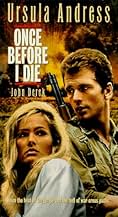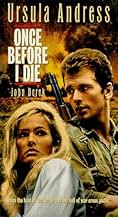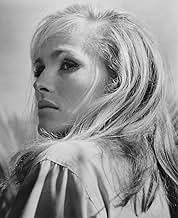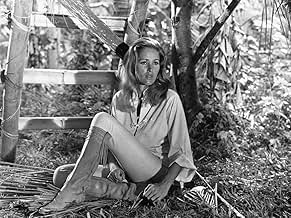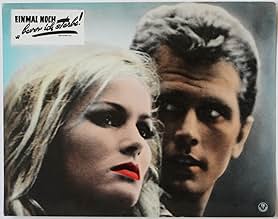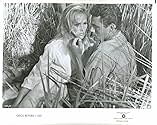Füge eine Handlung in deiner Sprache hinzuWW-II 1941: Shortly after Pearl Harbor the Japanese attack the Philippine islands. A group of Polo playing soldiers and their families are surprised far off in the countryside. Lt. Bailey le... Alles lesenWW-II 1941: Shortly after Pearl Harbor the Japanese attack the Philippine islands. A group of Polo playing soldiers and their families are surprised far off in the countryside. Lt. Bailey leads them back to Manila, but the streets are jammed with fugitives. On the trip Bailey's f... Alles lesenWW-II 1941: Shortly after Pearl Harbor the Japanese attack the Philippine islands. A group of Polo playing soldiers and their families are surprised far off in the countryside. Lt. Bailey leads them back to Manila, but the streets are jammed with fugitives. On the trip Bailey's fiancée Alex talks with a 22 years old shy soldier. He tells her of his fears to die and ad... Alles lesen
- Regie
- Drehbuch
- Hauptbesetzung
Empfohlene Bewertungen
I saw it in the days of antenna TV, when we were lucky if we could make out faces. Antenna TV was why it was necessary to make TV shows and movies (which would eventually go to TV) with very different looking actors, unless it was a plot device to cause confusion.
It had a style to it. And I didn't become annoyed by the Ursula character, probably because while the title suggested her character was the forefront, she was actually just the backdrop.
Her story about the soldier who may die a virgin, and other soldiers who are constantly near her, is the weaker story here, and is downplayed, despite the title.
The strong story, which really became the forefront story, was the one about the loose cannon soldier.
The loose cannon soldier dominates the story, especially in a scene where he gives an account of how he destroyed an enemy unit, and is ridiculed by those he gives the account to, until he shows them the proof.
It probably would have been a much better film without Ursula in it, although she is talented, and does her best. The fact is that her part is just not really a part of the story here.
When his acting career was no longer going well, John Derek (1926-1998) tried his hand at directing. Not a bad idea in itself, but talent should be there. Filming for the Hollywood major WARNER BROTHERS took place in the Philippines.
In 1941, the Americans stationed in the Philippines are enjoying life: the beautiful Swiss woman Alex (Ursula Andress) is sailing through wild waters in a canoe, her tanned fiancé, Major Bailey (John Derek), is having fun playing polo with his men. Suddenly an air raid by the Japanese and all hell breaks loose! Alex - contrary to her gray-haired lover's urgent orders - doesn't get to safety in Manila in time, but first picks up her sweet puppies. Missed airplane! You can't be that stupid! Now the breathtaking beauty has to fight her way through the jungle with the major's troops, always accompanied by Japanese attacks. Soon there are the first victims: the major also dies when he discovers a cuddly toy for his beloved and clumsily loses his hand grenade. WUMMS! Can that be grasped? From now on it's all about who can land with Alex to become the Major's successor. The men blithely fawn over the beautiful woman, who repeatedly emerges from various rivers with a soaking wet blouse. A well-built captain (Ron Ely from the upcoming TARZAN television series) tries hard. The fanatical, sadistic Lieutenant Custer (really good: Richard Jaeckel) enjoys killing the enemy, but he is a little afraid of the dream woman. However, a shy 22-year-old (one-hit wonder Rod Lauren) wins the jackpot. He confesses to the beautiful Swiss woman that he has never slept with a woman. One more time - before I die! Of course the blonde beauty helps out and fulfills the virgin soldier's deepest desire. During a Japanese tank attack, she gives herself to him in the tall grasses of the Philippines. Oh, that's nice! Dreams come true! Then the inevitable end can come...
You can tell that war slaughter is unpleasantly mixed with erotic kitsch here. Without the involvement of his wife Ursula Andress (their marriage had long since divorced before the film's premiere), John Derek would certainly not have been able to raise the film's budget. But portraying her as a naive sexual object in the chaos of war doesn't seem very credible. John Derek, who completed his military service in the Philippines, can be credited for having an eye for the country and its people. However, the gimmicks with frozen images and crossfades seem too trying and don't fit with the plot. Richard Jaeckel in the role of the nasty bald berserker is really good. Marlon Brando was able to copy a lot of things for his Colonel Kurtz. But this storyline is pushed far too much into the background by the flat waste of Golden Globe winner Ursula Andress as an erotic eye-catcher.
Conclusion: If you enjoy admiring the beautiful Ursula Andress in a confusing war film, you will get your money's worth here. For everyone else, this film has rightly been forgotten.
Wusstest du schon
- WissenswertesShot over the summer of 1964 but not released until early 1967. John Derek and Ursula Andress separated shortly after production wrapped and were divorced by April 1966, a year before the movie came out. Andress and bit player Ron Ely were rumored to have been having an affair throughout filming.
- SoundtracksOnce Before I Die
Words and Music by Norman Gimbel (as Norman Gimble) and Ralph London
Sung by Lenny Welch
Through courtesy of Kapp Records
Top-Auswahl
- How long is Once Before I Die?Powered by Alexa
Details
Zu dieser Seite beitragen


